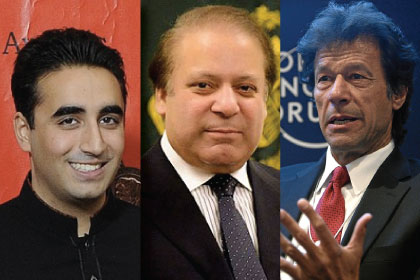Deposing governments sans violence
Pakistan’s upcoming general election is an example of a slow-motion coup without the accompanying violence as the military deposes an inconvenient prime minister with a more pliable candidate
 Courtesy: Gateway House
Courtesy: Gateway House
Pakistan’s upcoming general election is an example of a slow-motion coup without the accompanying violence as the military deposes an inconvenient prime minister with a more pliable candidate
 Courtesy:
Courtesy:
A report published by the IEA and the World Economic Outlook (WEO) claims that electricity reaching every Indian village is “one of the greatest achievements in the history of energy.” Our Energy and Environment expert, Amit Bhandari, spoke to SBS Radio (Hindi – Read more
 Courtesy:
Courtesy:
Recent Gateway House research publication, Chinese Investments in South Asia, was mentioned in a news report by the Maldives Independent. The article talks about Maldives President Nasheed declaring plans to renegotiate Chinese investments in the island nation and the accompanying debt. Read more
 Courtesy:
Courtesy:
Our recent map publication, Chinese Investments in India’s Neighborhood, was mentioned in the Nikkei Asian Review in an article on the increasing role of Chinese investments across elections in Asia. Read the full article here.
 Courtesy: Wikipedia
Courtesy: Wikipedia
The high cost and political impact of Chinese-funded infrastructure in countries like Myanmar, Malaysia and Sri Lanka make it imperative for India to work with Japan to provide alternatives, to ensure that the region is neither bankrupted nor militarised by Chinese influence.
 Courtesy: Chinanews
Courtesy: Chinanews
Pakistan is about to launch two military satellites in June with aid from China. It is pursuing its renewed space programme, using the same clandestine tactics it used for developing its atomic programme
 Courtesy: GLOBSEC 2018
Courtesy: GLOBSEC 2018
The GLOBSEC Bratislava Forum’s annual conference this year saw discussions on technology take precedence over geopolitics. Experts pointed out the gap between the adoption of digital technology and managing its risks
 Courtesy:
Courtesy:
Distinguished Fellow in Foreign Policy Studies at Gateway House, Amb. Rajiv Bhatia, joined reporter Ashok Shrivastav on DD News to discuss Prime Minister Narendra Modi’s trip to Indonesia, Malaysia, and Singapore. Watch the segment here or below (from 10:35):
 Courtesy:
Courtesy:
Gateway House research publication, Chinese Investments in South Asia, was recently mentioned in the event coverage of ‘The Role of Indian Navy in the Changing Security Environment’ by Admiral Sunil Lanba, PVSM, AVSM, ADC, Chief of Naval Staff’ at the Read more
 Courtesy:
Courtesy:
Gateway House Fellow for Energy and Environment Studies, Amit Bhandari, was quoted by publication Energy Intelligence on India’s production of biofuels at a time when oil prices have reached record highs. The article is only available for subscribers of Energy Intelligence Read more